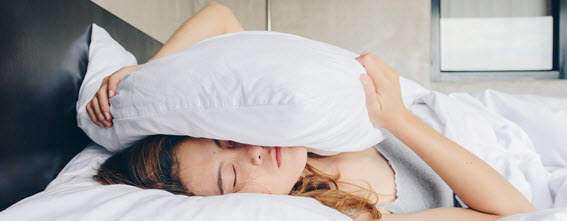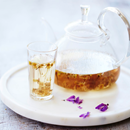
APEX Insights > Inspire > The key to unlocking great sleep

July 2020
The key to unlocking great sleep: Links between poor sleep and gut health
Do you struggle with your shut-eye? Scientists are now uncovering the relationship between our microbial ecosystems and sleep. Yes, that’s right: our sleep quality is also being linked to the health of our gut.
Sleep is vital to our health and daily functioning, as it’s the time when we restore energy and repair our cells. Sleep assists your brain function, enhances your learning and problem-solving skills. It’s good for your heart health and blood vessels. Having an adequate amount of snooze time can help you to pay better attention, have easier control over your emotions, and even enhance your creativity.
Did you know that your gut could be the key to unlocking great sleep? Research shows how it profoundly impacts a range of psychological functions, from regulating the hormones that control sleep and wakefulness, to shifting our circadian rhythms and altering our sleep-wake cycle.1
Right now within your body, there’s a complex communication interplay between your microbiome and your brain, which can be linked with depression, anxiety, and emotional stress; and these factors can have an impact on the quality of your sleep too.
An unhealthy balance of microflora has also been shown to increase pain perception, and with the connection between pain and poor sleep very clear, a healthy gut can help minimise the experience of pain, therefore promoting more peaceful sleep.
Your circadian rhythm is the 24-hour biological system that maintains and balances sleep and wake cycles, and your microbiome also has its own rhythms that are capable of influencing and disrupting one another. Microbes have a mind of their own, including how they affect our sleep.
The intestinal microbiome both produces and releases serotonin and dopamine, which maintain a healthy mood and sleep patterns. As night-time approaches, your levels of serotonin increase and send signals to the brain to start producing melatonin, the hormone that stimulates sleepiness and controls your sleep cycle. This process is vital if you want to enjoy a good night’s sleep.2
It has also been proven that healthy bacteria can produce serotonin by stimulating the intestinal cells, meaning the healthier your gut is, the better you will sleep.3
From the opposite direction, a deficiency of melatonin, known as ‘the darkness hormone’, has been connected with increased intestinal permeability.
Sleep is the ideal time for your body to regrow, repair, recharge, and replenish — but for this to happen, you need to go into a ‘deep sleep’. It can take up to four hours to get into this deep sleep stage, and only 25 percent of our sleeping time is spent in this ideal stage of sleep. This is why it’s valuable to get at least 8 hours of sleep — to make sure you’re spending enough time in a deep sleep.

Click here for Macadamia, Garlic and Parsnip Soup recipe.
Diet & Sleep
When it comes to diet and sleep, try to avoid foods that cause irritation within your gut and immune system, causing issues to flare up at night and disrupt your sleep.
Late-night snackers, hold your horses. While tucking into treats like chocolate and a sneaky glass of red before bed may seem like a good idea, these foods can hinder your ability to fall, and to stay, asleep. My advice for better sleep is to try to eat early and avoid any stimulating, caffeinated, or inflammatory foods, aiming for easy-to-digest, nutrient-dense dinners. Nourishing soups and slow-cooked casseroles are great dinner options.
To help digestion, before dinner you can also incorporate a pre-digestive, these aid digestion as they contain naturally occurring digestive enzymes, meaning that thankfully, much of the hard work is done for you, allowing your body to focus on absorption. One popular pre-digestive is an apple cider vinegar shot. Apple cider vinegar has probiotic enzymes to help balance gut bacteria. Having a shot around 20 minutes before meals can help to improve nutrient assimilation and balance pH levels. Just mix a quarter of a cup of warm water, a tablespoon of apple cider vinegar, a tablespoon of lemon juice, and to give it a little sweetness, you can add a teaspoon of raw honey. All you need to do then is mix all the ingredients in a small glass and drink before meals to aid digestion. You can follow it with more warm water if needed.

You can read more about some gut-friendly beverages here
But what about coffee and alcohol do they affect sleep?
We all know that caffeine isn’t the best thing to have before bed because it acts as a stimulant. So that means just no coffee, right? Not exactly. There’s caffeine in chocolate, black tea, and soft drinks too. The overconsumption of caffeine, especially at night time, stimulates the central nervous system and can cause a plethora of negative health effects, like insomnia, nervousness, irritability, and even muscle tremors.
If you have trouble sleeping, I recommend switching your coffee and tea to decaffeinated after 2 pm to avoid stimulation of your nervous system and to help calm your mind. Craving a hot drink before bed? Opt for herbal tea such as chamomile and lavender or peppermint that help to calm and promote sleep.
While red wine can make you feel a little sleepy, drinking alcohol can negatively impact sleep. Alcohol has proven to cause disturbed sleep and make falling asleep more difficult. Not only that, drinking alcohol can make you more likely to need to get up in the middle of the night to go to the bathroom. If you’re not willingly going to give up alcohol before bed for yourself, do it for your partner; alcohol has also proven to worsen snoring!
SNOOZE CONTROL
The benefits of sleep are so extensive and make such a world of difference to your quality of life, it’s vital to ensure you’re getting sufficient and consistent sleep, especially if you’re trying to improve something as paramount as the health of your gut.
Here are some of my favourite ways to encourage a good sleep cycle and make it easier to nod off when it’s time for lights out.
EXERCISE REGULARLY
This will assist with your energy levels throughout the day, and help you sleep better at night — but don’t exercise too close to bedtime as this can interfere with your sleep.
UNWIND BEFORE BEDTIME
Avoid anything stimulating for at least 20 minutes before bedtime. Televisions, computers, mobile phones, and laptops all produce ‘blue light’, which can slow down the production of melatonin.
KEEP YOUR ROOM COOL
To enable you to reach deep sleep, your body needs to cool down; if your body is already at a lower temperature when you hit the sheets, it’ll spend less time trying to cool down and you’ll reach a deeper sleep more quickly. Plump your pillow, nuzzle down, and drift away!
Some people say that you shouldn’t eat anything within two hours of bedtime. While I do agree with this, it’s sometimes unavoidable; we’re all human. Good luck falling asleep when you’re ravenous! If you are hungry before bed, choosing to eat something light and full of potassium and minerals will help you to have a better night’s sleep so you are ready for the workday ahead. Certain fruits such as bananas, cherries, and pineapple contain melatonin which can help the sleep cycle and enable you to fall asleep quicker. Bananas also include tryptophan and magnesium both helping with sleep, I recommend having these foods with calcium such as yoghurt as it can facilitate the body’s ability to absorb and use tryptophan.
Gut health is important for your mental health and overall wellness, it’s one of the most important components of the body. We interact with it daily and it’s something intricately connected to many aspects of our everyday life.*
OnePath Life Limited (OnePath Life) is committed to deliver market leading mental health and wellness solutions with a focus on service, customer wellness and prevention. The focus on mental health and wellness is at the core to OnePath Life’s proposition. To deliver on our commitment, we have developed a suite of tools, education pieces, and collaborated with partners to provide our customers with the support they may need to facilitate a healthy life. OnePath Life has proudly partnered with Lee Holmes to provide education and nutritional inspiration for our customers to supercharge their health.
References
* Important note
The information related to your health is not intended to be a substitute for professional medical advice, diagnosis, or treatment. Always seek the advice of your physician or other qualified health provider with any questions you may have regarding a medical condition.
This material is intended for the use of financial advisers only and is distributed by OnePath Life Limited (OnePath Life) (ABN 33 009 657 176, AFSL 238341).
The information, opinions and conclusions in articles ("information") are current as at the date articles are written as specified within but are subject to change. The articles are provided and issued by OnePath Life unless another author is specified in the article, in which case it is provided and issued by that author. The views expressed are those of the authors only and do not necessarily reflect the opinions or views of OnePath Life, its employees or directors. Whilst care has been taken in preparing this material, OnePath Life and its related entities do not warrant or represent that the information is accurate or complete. To the extent permitted by law, OnePath Life and its related entities do not accept any responsibility or liability from the use of the information.
The information is of a general nature and has been prepared without taking into account a potential or existing investor’s objectives, financial situation or needs. Investors should consider whether the information is appropriate for them having regard to their objectives, financial situation or needs. For any product referred to above, OnePath Life recommends that investors read any relevant offer document or product disclosure statement and consider if the product is appropriate to them. For products issued by OnePath Life, these documents are available at access.onepathsuperinvest.com.au.
Past performance is not indicative of future performance and any case study shown is for illustrative purposes only. Neither are a prediction of the actual outcomes which will be achieved. Where tax or technical information is included, the information is our interpretation of the law and does not represent tax advice. An investor is advised to obtain professional advice relevant to their individual circumstances.